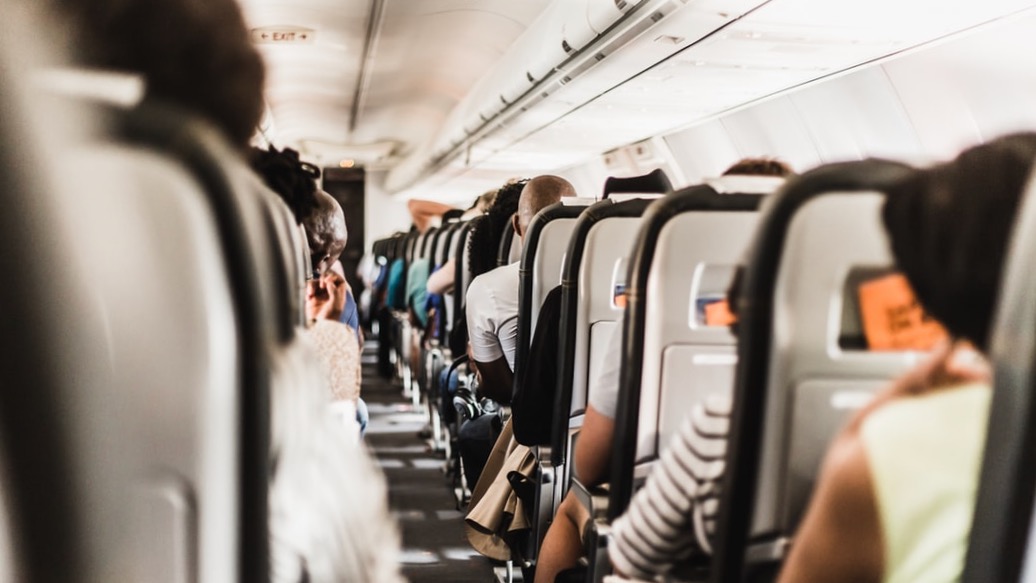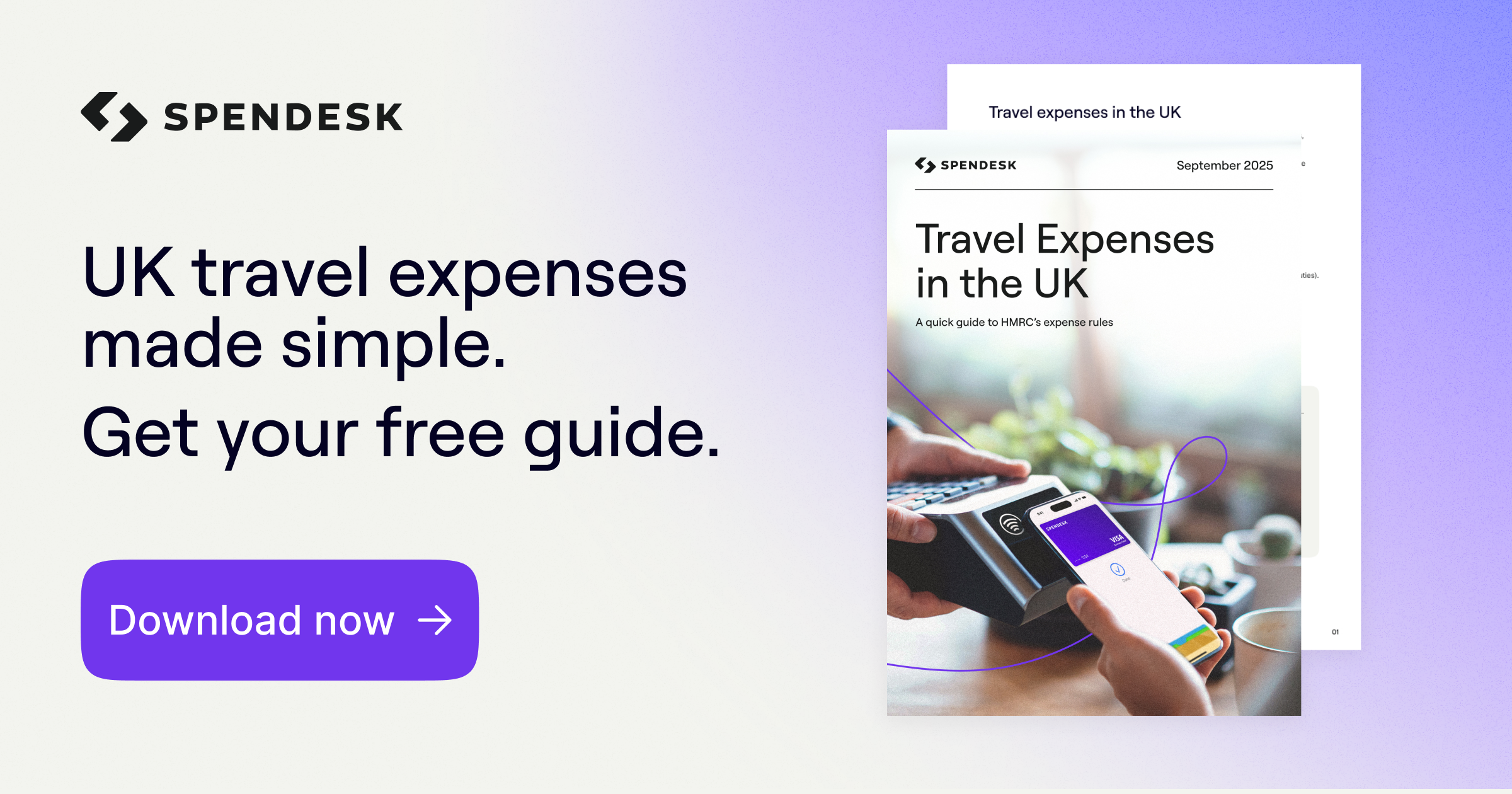)
Corporate travel has developed a love/hate reputation. For employees, it's exciting to get out of the office and change up the routine. For employers, travel is a key driver of growth. Meeting prospects and clients in person is still incredibly effective, even if it feels a little old-fashioned.
So there's plenty to love.
And yet, managing travel - and especially travel expenses – is nobody's idea of a good time. Particularly when the rules and regulations from HMRC aren't clear to everyone.
So to help, we've put together this guide to travel expenses for UK businesses. Once you understand what HMRC expects (and therefore what you need to do), managing travel doesn't feel quite so painful.
Now, let's start with the obvious question.
What are travel expenses?
As the name suggests, travel expenses are company expenses incurred while travelling. These include transport costs, meals, and vehicle mileage, among others.
And as with all legitimate business expenses, companies may be able to claim tax relief on these costs. If it meets all of the correct requirements, business travel is normally free from tax.
So both for companies and individual employees, it makes fiscal sense to track and claim tax relief on business trips.
HMRC travel expenses: The basics
HMRC may provide tax relief if costs fall into the following categories:
Public transport costs
Hotel accommodation if you have to stay overnight
Food and drink
Congestion charges and tolls
Parking fees
Business phone calls and printing costs
Mileage
As long as these occur during business travel, the company should be able to claim relief.
So what counts as business travel?
LeeP Financial shares this handy reference guide for company managers and employees:
Part of what makes all this tricky is the overlap between private and business travel. It’s not always clear exactly what counts as each.
Private vs business travel

The distinction between these two forms of travel is a common cause of confusion. It’s simply not always clear cut whether a trip is entirely for personal or business reasons.
There can easily be portions of a business trip that look like personal travel, and vice versa.
According to HMRC, only two types of travel qualify as 'business' trips:
Journeys employees make in the performance of their duties (where travel is part of their duties)
Journeys to or from a place they have to attend in the performance of their duties (travel to a place where attendance is in the performance of the duties). This usually means visiting a temporary workplace or site outside of their regular commute.
So if travelling is your job, or if you have to visit a specific location in order to do your job, this is business travel.
It's important to note that 'ordinary commuting' is not counted as business travel.
Travel expenses for employers
Employers are required to report all travel expenses paid to employees during the year. There are exceptions to this rule, such as when you’re paying HMRC’s advisory rates or have obtained a specific exemption.
A few things to keep in mind:
Some expenses, like fuel and meals, have fixed rates. If you repay employees at higher rates, these become earnings (like salary) and are subject to PAYE and National Insurance.
If you provide extras like transport to employees for private travel, this becomes a benefit and is subject to National Insurance as well.
To be deductible, expenses need to be 'wholly and exclusively incurred' for the purposes of running the business or generating more business.
But this doesn’t mean every aspect of a trip needs to be related to business. Bleisure trips are acceptable, but only the business part of that trip can be deducted.
This should be common sense for most businesses. You shouldn't have trouble managing travel as long as records are kept and there is a process in place.
Travel guidelines for employees
You might be able to get a tax refund from HMRC if you had to pay for work travel expenses and your company didn’t pay you back.
To claim tax back for any kind of work expense (including travel), a few conditions must be met:
You personally pay for a necessary work cost
This cost is only necessary for work
Your employer doesn’t pay you back
Your employer doesn’t offer you a suitable alternative
And of course, you also have to pay tax, since this is a tax break.
Claiming travel expenses from home to work
We’ve seen that travel expenses can be claimed if you’re travelling to a place of work. But equally, you can’t claim if your travel counts as commuting. So what’s the core difference?
Permanent vs temporary workplaces
Commuting is the regular travel you make to a permanent workplace. Thus, if you want to claim tax back for work travel, these trips need to be to or from a temporary workplace.
In most cases, that’s going to be pretty simple. If you’re out on a sales call, going to a conference, or visiting another branch of the company, you’re not going to your permanent workplace.
Another little note: If your travel to a temporary workplace is not really any different from your regular commute (in time, distance, or costs), you can’t claim relief for this either. So if you're heading to a client just down the road, this is probably not going to count. For further details, read the section on "the 24-month rule" below.
Common causes of confusion
Let’s look now at a few of the most common - and often most confusing - areas for mistakes.
Meals and subsistence rates
Not every single pound, dollar, or euro spent while travelling is going to be reimbursed. That would leave the door open to abuse – Michelin-starred meals and exorbitant bar tabs claimed as ‘business costs’.
To set clear rules and expectations, HMRC has provided a list of meal allowance rates for different cities and countries. These work like a per diem, standardised for all UK businesses. And they also include the cost of accommodation.
When reimbursing employees for meals, companies have a few options:
Use the set amounts allowed by HMRC
Negotiate another rate with HMRC, if the rates provided don’t meet the company’s needs
Reimburse employees in full, no matter the cost
Note: If your business opts for the third choice, the amount reimbursed will only be tax-free up to the amount allowed by HMRC. So you can reimburse at a higher rate if you choose, but you’ll have to pay tax on the difference.
Read our full article on meal allowance rates here.
Fuel rates
Alongside meals, HMRC has also standardised the amount companies can reimburse employees for fuel tax-free. This reflects the fact that every car has a different expectation of efficiency and that fuel prices fluctuate.
Instead of trying to deal with this on a case-by-case basis, HMRC has assigned advisory fuel rates for company travel. These apply in two cases:
When reimbursing employees for work travel done in company cars
When employees need to repay the company for private travel in a work car
In both cases, advisory fuel rates tell companies and employees how much they should pay or get per mile.
Use our HMRC Mileage Claim Calculator to learn how to claim mileage allowances and calculate reimbursements.
The 24-month rule
We already wrote a detailed explanation of HMRC's 24-month rule. It's a simple test to help you figure out if a workplace is temporary or permanent. If it's permanent because of the 24-month rule, employees and companies can't get tax relief for travel expenses.
Two main conditions must be met for the 24-month rule to apply:
The employee must have spent or be likely to spend more than 40% of their working time at a workplace, AND
They must attend it or be likely to attend it over a period lasting more than 24 months.
So, if you spend more than 40% of your time in one workplace over a 24-month period, that's a permanent workplace.
There can be complications to these rules, so it's worth reading the linked article for more details.
Employed, self-employed, both, or neither?
Naturally, there’s no one-size-fits-all rule for employee travel. Your tax rights and obligations depend on your employment status, among other things.
And, especially in the modern career landscape, there are a whole range of different circumstances that can complicate matters. These affect:
Agency staff billing out time to clients
Employees working through umbrella companies
Contractors working through a limited company for a larger company
‘Personal Services Companies’ (hairdressers, care workers, and labourers, among others) fall under the IR35 legislation and may have other obligations.
This isn’t the time or place to go into all of these circumstances in detail. This post from the Low Incomes Tax Reform Group does a great job of highlighting the differences.
But to clarify: in this post, we’re mainly speaking to companies and their full-time employees.
Best practices to manage travel expenses
As a bonus, here are a couple of tips and best practices on handling travel expenses from around the web.
 Contractor Calculator - Keep clear records
Contractor Calculator - Keep clear records
Contractor Calculator writes for contractors - obviously. But this advice is valuable whether you’re a sole practitioner or run a company of 10,000:
“Both limited company and umbrella company contractors must retain copies of receipts and tickets, and detailed mileage logs so that they can prove the journey actually took place if investigated by HMRC”.
And of course, you’ll want those receipts if you have come up against a full-on audit.
Spendesk – Automate as much as possible
Aside from misunderstood rules, the biggest issues with travel expenses normally relate to admin. Filing and processing every single expense claim by hand is a huge productivity killer.
When it comes to business travel, the more you can automate your expenses, the better.
This means looking for a good travel and spend management tool, like Spendesk. These let you automate processes, and also build in your company travel policy to keep everyone in line.
Work travel shouldn’t be a bore
For many employees, travelling for work is a great privilege. The chance to visit new cities, meet clients, and have new experiences is too good to pass up. They’re the lucky ones.
Business travel often gets stuck in the small details. The little things – expense reports and transport issues – can overshadow what should be a break from the norm. Which is a shame.
But with good planning and better technology, corporate travel goes back to being a benefit. So find yourself a good travel management tool, get a smarter way to track expenses and store receipts, and stop sweating all of those little issues.
You can start with this clever travel planning workbook.
For more information about HMRC's rules and guidelines, take a look at these other recent articles:
)

)
)
)
)
)
)